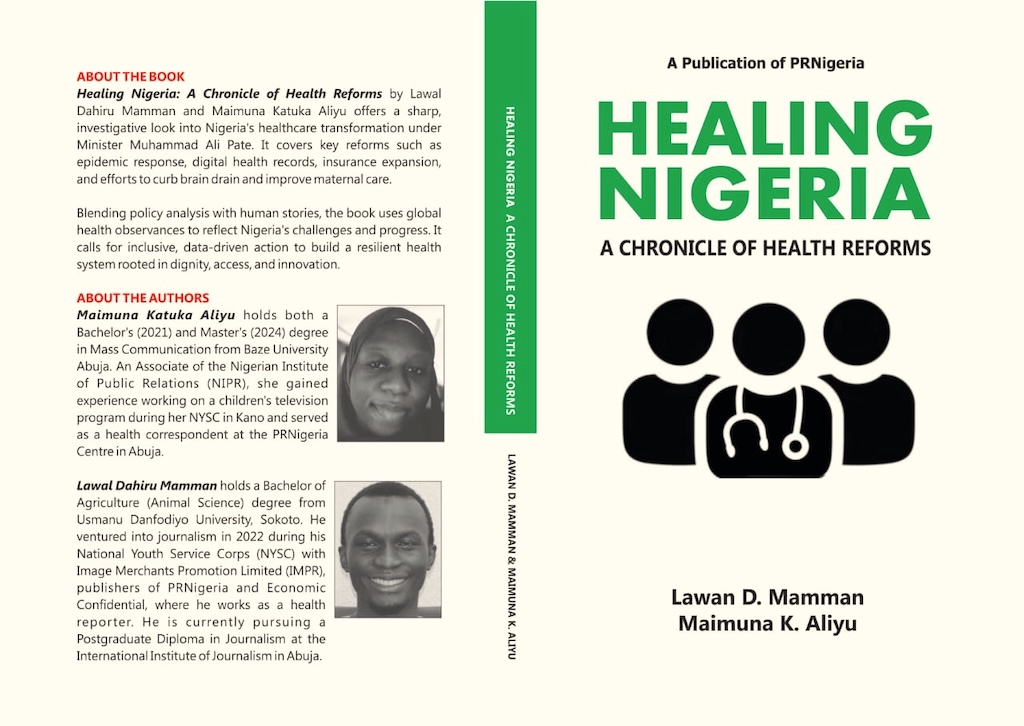Healing Nigeria: A Chronicle of Health Reforms stands out as a timely exploration of Nigeria’s journey toward a more equitable and resilient healthcare system. Authored by Lawal Dahiru Mamman and Maimuna Katuka Aliyu, this compendium of 32 essays delves into the evolution of the country’s health sector—tracing its trajectory from colonial practices to the fast-paced, contemporary challenges of today. Far from just a compilation of past reforms, the work uncovers stories of both groundbreaking innovations and lingering setbacks, painting a realistic but hopeful portrait of Nigeria’s ongoing pursuit of health justice.
One of the unique characteristics of this book lies in its commitment to balance. Rather than focusing exclusively on failures or over-celebrating victories, the authors strive to present a nuanced view that is rare in policy analysis. With case studies drawn from across Africa and vivid portrayals of front-line health workers, policymakers, and patients, the book succeeds in pulling the often-abstract realm of health policy down to the human level. Addressing health equity as more than just bureaucratic jargon, the essays demonstrate—through lived experience—why these issues matter to real communities in Nigeria and beyond.
The breadth of the book’s subject matter is impressive. Essays tackle everything from Nigeria’s battle with infectious diseases like malaria and Ebola, to the silent struggles associated with mental health, financing difficulties, health insurance coverage, the role of technology in health, and the National Health Insurance Scheme (NHIS). These diverse perspectives reflect the intricate way in which health reforms interact, underscoring the fact that system-wide transformation can’t be achieved through isolated efforts. According to Abuja-based health strategist, Dr. Joy Onubogu, “Nigeria’s health sector requires a holistic approach—piecemeal interventions often fail to address the root causes of our biggest health challenges.”
Perhaps most compelling is the book’s insistence on accountability and genuine system change. Nigeria’s policymakers have made many high-profile commitments to health reforms, but follow-through has often lagged behind. As analysts like Lekan Adebayo of Policy Watch Nigeria point out, “Well-written policy documents alone don’t save lives. The real test is what happens on the ground.” The call for sustained implementation resonates now more than ever, as Nigeria renews its promises to rebuild health infrastructure, expand insurance, and ramp up medical training. According to the 2023 World Health Organization reports, Nigeria still faces some of the region’s highest burdens of maternal and child mortality, reinforcing the urgent need for action, not just rhetoric.
The book is also lauded for its accessible style and reader-friendly presentation. Each essay is brief and thematically focused, allowing readers—from university students to senior policymakers—to engage without feeling overwhelmed. Its thoughtful layout and clear language make complex policy discussions approachable, even for those without specialized backgrounds. “I like how you can jump from a chapter on digital innovation straight to community case studies and still see the connecting threads,” shared one Lagos-based medical student after attending the public book launch. This modular approach reflects the real-world interconnectedness of health system components—from primary care clinics in rural Kaduna to modern cancer centres in Lagos.
Nevertheless, no single collection can capture the full depth of its subject. Some critics have noted that while the authors highlight major barriers—such as bureaucratic delays, political reluctance, and weak incentives—further analysis and practical strategies for overcoming these obstacles would enhance the book’s usefulness for reformers. For instance, an in-depth exploration on how countries like Ghana or Rwanda have tackled similar health system bottlenecks could provide actionable lessons for Nigerian stakeholders. Additionally, some essays could benefit from firmer evidence, independent assessments, or cross-country benchmarks to illuminate which reforms have delivered real, measurable improvements on the ground.
Another lingering question is the issue of prioritisation. With the broad sweep of topics it covers, the book raises important issues but leaves readers—especially the non-experts—wondering which reforms should take precedence under Nigeria’s resource constraints. As Professor Ibrahim Musa of Ahmadu Bello University explained, “Effective health reform depends on getting the sequence right—trying to do everything at once can leave you accomplishing little.” Without a clear framework for sequencing or trade-offs, some policy recommendations may risk being lost in an already crowded reform landscape.
Yet, the overarching message remains optimistic. Despite the persistent hurdles, Healing Nigeria reminds readers that genuine progress is achievable. By candidly recounting past failures alongside notable achievements, the book refuses to succumb to cynicism. For instance, the significant strides in cancer care provision, and the expansion of digital health records in select states, are evidence that policy changes—when implemented—can transform lives. This spirit of hope is essential for mobilizing broad-based citizen engagement in health reform processes across Nigeria, Ghana, and the broader African region.
An additional strength of the book is its human-centred narrative. Rather than treating reforms as distant or technical initiatives, each essay emphasizes how policy decisions and delays impact families and health workers in everyday situations. Whether discussing the pain of delayed drug deliveries, or the hope sparked by new clinics opening in remote communities, the book brings policy issues back to the people most affected. Civil society advocate Aisha Sanni notes, “When you see how a poorly constructed policy can mean death or hardship for real Nigerians, it becomes more than a debate—it’s a moral responsibility.”
Ultimately, the work serves as more than a chronicle; it offers a comprehensive blueprint for navigating Nigeria’s health reform journey. It provides key lessons for health professionals and government officials, communications strategies for advocates, and crucial background for students of public health and policy. Importantly, for everyday Nigerians—the people most in need of quality healthcare—the book brings context that explains why certain services are poor, why reforms matter, and where the nation is headed. It also highlights the pivotal role of transparency, and the need for continual pressure on leaders to convert promises into actual improvements.
Published by Image Merchants Promotion Limited (IMPR), better known as the force behind PRNigeria and Economic Confidential, the book is a welcome addition to the discourse on African health reforms. While it isn’t positioned as a technical resource for data analysts or economists, it purposely makes health policy discussions approachable, wide-ranging, and relevant to everyday life—bridging the gaps between theory, activism, and real-world impacts.
Attending the book’s unveiling was an eye-opening experience. For many, the resonance of Healing Nigeria comes from its moral clarity—the unwavering assertion that healthcare reform is about dignity, justice, and basic human survival. The call to action is clear: as a nation, Nigeria’s route to recovery remains open, but it will require commitment, courage, and a shared determination to see meaningful reforms through to their conclusion.
What reforms do you believe should be prioritized in Nigeria’s health sector, and how can communities hold leaders accountable for progress? Share your thoughts in the comments below and join the conversation on the future of African health!
Have you witnessed a major health reform, community story, or have an opinion to share? We want to amplify real voices! Send your stories, tips, or perspectives to story@nowahalazone.com for a chance to be featured or to discuss story sales. For general support, reach out at support@nowahalazone.com.
Follow us on Facebook, X (Twitter), and Instagram to stay updated with the latest discussions, health stories, and African reform news!









